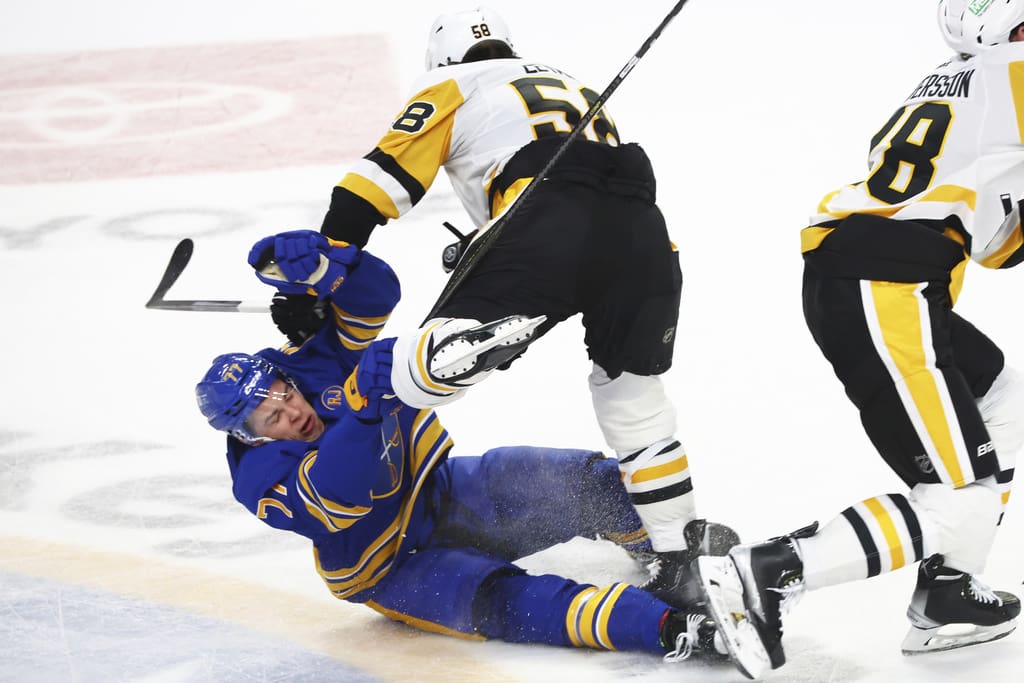Penguins
Penguins Blog: Troubling Disparity; Is Dubas Reaching?

Over the past few weeks, an observation has pinged around this scribe’s noggin. After trying to make sense of so much incomprehensible Pittsburgh Penguins hockey over the better part of six months, there came a stark counterexample.
Why were two rookies the most structured, predictable, fundamentally sound players on the roster?
After months of watching veteran players make ghastly mistakes, I ran out of synonyms. Terrible, awful, ungodly, horrifying, dreadful, grievous, grisly, and so on. We used them all.
The one word that I rarely, if ever, used was lazy. But maybe I should have?
After months of watching blue line turnovers, chaotic track backs, missed coverages, soft defensive zone efforts, loose gaps, and more missed coverages, Rutger McGroarty and Ville Koivunen showed the difference between the garbage hockey we were watching and how a good team should look.
McGroarty and Koivunen weren’t the product of adrenaline-fueled debuts, but lifted by good hockey IQs and a genuine desire to play the game the right way. Their immediate contributions were a credit to general manager Kyle Dubas’s eye in trading for the prospects, the AHL program that Wilkes-Barre/Scranton GM Jason Spezza built, and to first-year head coach Kirk MacDonald.
More are on the way. Roster construction issues and injuries at both levels prevented Dubas from recalling Tristan Broz late in the season, too. Dubas referenced the desire to recall Broz, but didn’t want his first NHL roster to be overloaded with forwards and short on defensemen.
Why could Koivunen and McGroarty play the right way when so many on the NHL roster made the basics look so optional?
While the rookies shone a positive light on the organization, the haphazard play of the NHL roster shone a negative light on the organization and coach Mike Sullivan. Why would Dubas put together so many players who are traditionally mistake-prone, and how much did the head coach exacerbate or fail to improve the situation?
There are 31 teams that won’t win the Stanley Cup, and 16 teams that won’t make the playoffs, but commitment to fundamentals, such as defending and puck management, should be the least a team brings each game. The disparity should be troubling to all participants on that side of the fence, and the first part of the summer should be spent answering for it, as well as fixing it.
Dubas Trade Strategy
The St. Louis Blues were the team that finally broke the seal and made signing restricted free agents OK. After a couple of decades of such talk and action being taboo, and previous attempts being met with public spats, we’ve finally reached a point in which a team can swipe another’s RFA without it becoming a public meltdown on an episode of Real GMs of Orange County.
However, on Monday, Dubas downplayed the idea of the Penguins signing RFAs. Instead, Dubas viewed trading for them as a likely usage of his enormous trove of salary cap space.
It’s a unique gambit that hasn’t really been tried before, but the attempt should be viewed with a little skepticism. It would have worked well a year ago. And it might be a perfect strategy in a few years when GMs again blow through their extra allowance of a rising salary cap on Minecraft add-ons and candy, then wake up with regret.
Intelligent strategy, but it might–might–be the wrong year. There is a large gaggle of teams currently choosing to rebuild, so competition for the unique assets will be fierce, and the available assets will be players who otherwise didn’t fit or aren’t re-signed for a reason.
The reason the RFAs aren’t re-signed is decreasingly a matter of cost, at least this summer. The top targets, such as J.J. Peterka in Buffalo or Mason McTavish in Anaheim, could be easily re-signed by their teams because Buffalo and Anaheim have tens of millions in cap space, as do the Penguins.
Combining Dubas’s comments from two different moments–the John Shannon podcast two weeks ago and Monday’s press conference– Dubas will be looking for centers and defensemen.
The reachable high-end RFAs could be K’Andre Miller of the Rangers and Nic Hague of the Golden Knights. However, trades require giving up something of value that the other party needs and wants. Fair market value has little to do with it.
Given the frequency of the Buffalo-Penguins trade rumors that circulated this season, the lack of a transaction would indicate that one side has to change its ask. And that should show how difficult this new tack is going to be.


